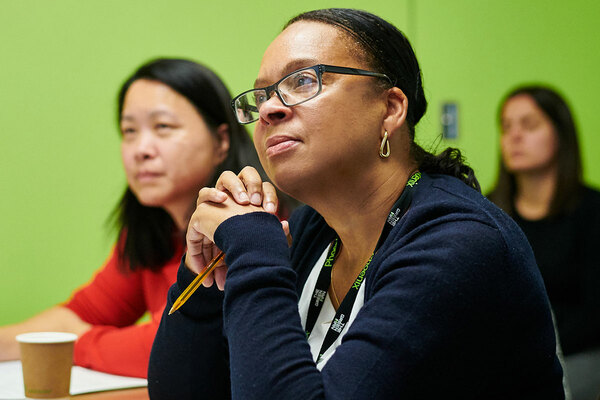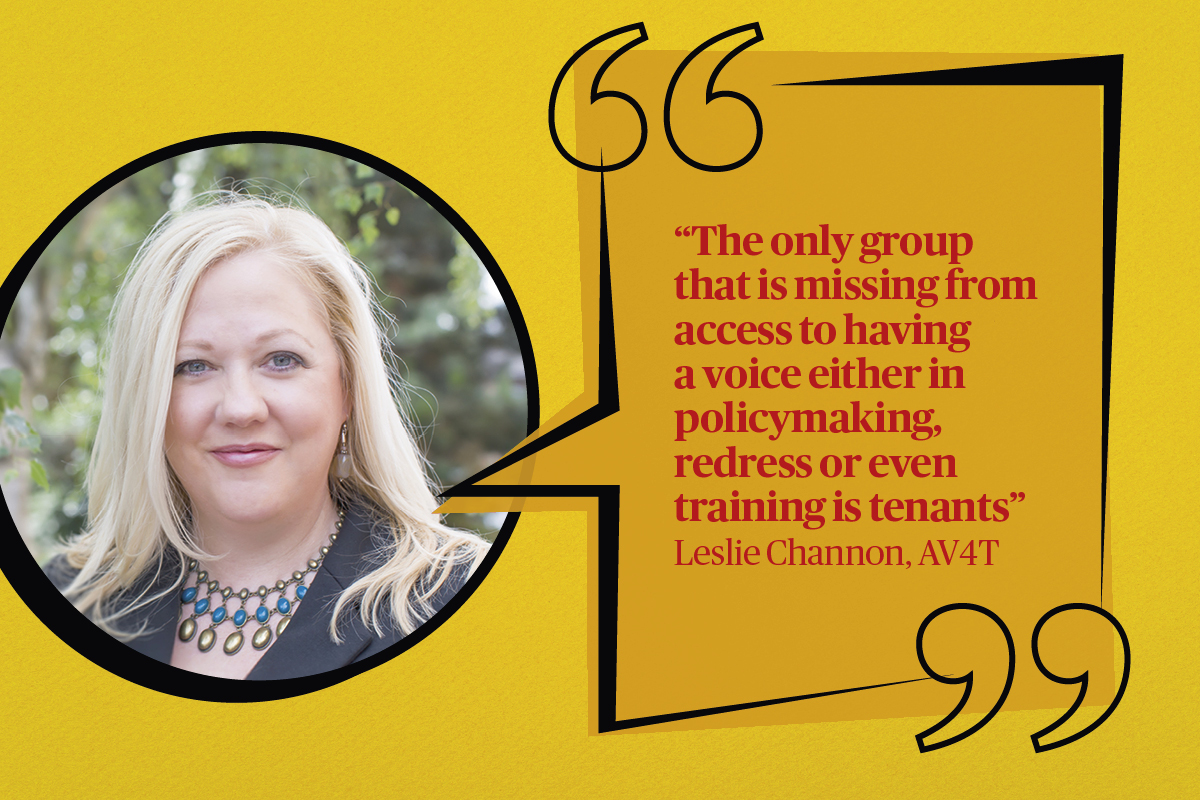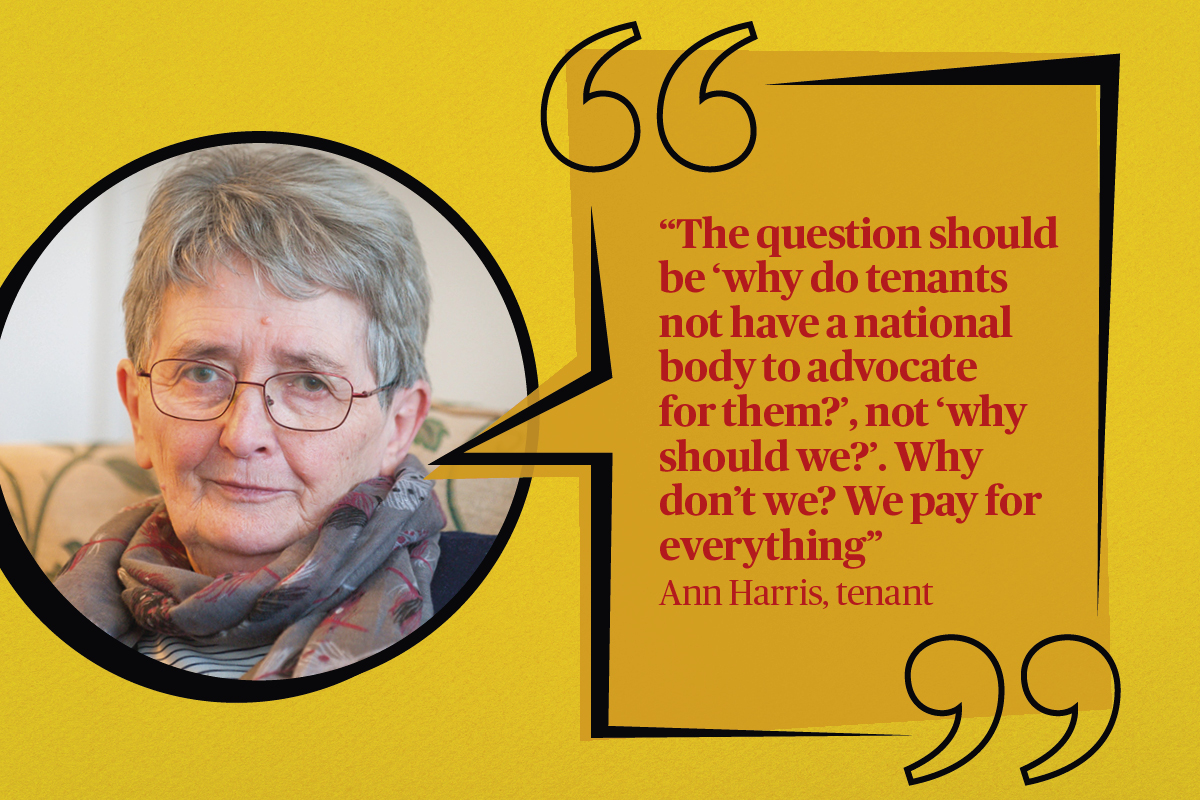You are viewing 1 of your 1 free articles
How the campaign for national tenant representation is gathering pace
Amid concerns that government is kicking the idea into the long grass, members of a campaign group calling for a National Tenant Voice asked Inside Housing to host a crisis meeting to build consensus across the sector and draw up an action plan. Martin Hilditch sat in to find out what is likely to happen next
Earlier this year, a frustrated tenant campaign group picked up the phone to Inside Housing.
The A Voice for Tenants (AV4T) steering group had been working closely with government for the best part of two years to help it set up meetings with tenants, as ministers drafted the Social Housing Green Paper. Expectations were high that, after years of neglect, the government might finally be taking tenants seriously at the highest level.
After all, current chancellor and then-housing secretary Sajid Javid had spoken publicly about his desire to challenge a status quo in which social housing had become “increasingly neglected, as did the people who lived in it”. In 2017, shortly after the Grenfell Tower fire, he had told delegates at the annual National Housing Federation (NHF) conference that “the establishment became detached, aloof and focused its attentions elsewhere. And the tragic events of 14 June showed exactly where that attitude can lead”.
Two years later, with the government’s attentions focused on Brexit, the campaign group felt that Whitehall was becoming detached once more. Commitments to make tenants’ lives better and, in the words of then-prime minister Theresa May, “bring them into the political process”, were starting to sound like empty rhetoric. Ministers who had spoken warmly of the need for some kind of tenant voice were becoming increasingly difficult to reach. The idea of even a scoping exercise to create some kind of National Tenant Voice or union was starting to seem as far away as ever.
Keen to move things forward, members of the AV4T steering group asked Inside Housing to hold a meeting to talk about how best to develop national tenant representation. Then-housing minister Kit Malthouse was invited but was unable to attend. This aside, however, the meeting was a who’s who of the housing sector, as most representative bodies – and housing charity Shelter – accepted the call for crisis talks.
Inside Housing agreed to host the meeting because it has previously backed calls to set up a National Tenant Voice and its Never Again fire safety campaign called on landlords to take steps to better address tenants’ concerns.
Chaired by Lord Kerslake, former head of the civil service and current chair of housing association Peabody, the meeting, which took place in the dying days of Ms May’s government, had some simple aims. First, to agree whether some kind of national voice for tenants is still needed – and if so, to set out why, particularly to inform the next housing minister’s thinking.
“There are issues around representation. [A tenant voice] could be a resource for residents’ groups around the country”
The meeting would then consider potential next steps.
We’ll start with that first, fundamental question: why should there be a National Tenant Voice?
Lord Kerslake says the reason he is asking is because “we may have a new housing minister in the next few months [he was right – Esther McVey replaced Kit Malthouse in July] and if you are sitting in front of them and they said ‘why?’, you need – bang – six killer arguments”.
For Leslie Channon, chair of AV4T, one of the important reasons is because tenants are currently at a disadvantage compared with other powerful voices in the housing sector, who have their own fully funded lobby groups.
“Landlords have a voice through the National Housing Federation [NHF],” she continues. “And other people within the sector, other groups, have a voice, so for me the only group that is missing from access to having a voice either in policymaking, redress or even training is tenants.”
Phil Murphy, a former firefighter and social tenant, who has been working with Tower Blocks UK and the University of Kent on a fire safety checklist for tenants, says that the absence of a powerful voice for tenants nationally means that “tenants are the only group that aren’t being expertly advised in the whole post-Grenfell scenario. Every other group has got expert advice apart from tenants.”
Jenny Osbourne, chief executive of Tpas, who is also on the AV4T steering group, says she thinks the most powerful argument “is around policymaking”. She says there needs to be “a body that the government cannot ignore when creating policy that affects those very people”.
She adds: “I think, at the moment, policy is being made about tenants without them ever having a seat at the table.”
Meanwhile, for Nick Reynolds, a Birmingham City Council tenant and chair of the National Federation of Tenant Management Organisations (also a member of the AV4T steering group), the need for a national tenant voice is simply “a no-brainer”. “Why shouldn’t tenants have a voice? Who knows better about where we live than us?”
Terrie Alafat, chief executive of the Chartered Institute of Housing (CIH), agrees. “It is not just about policymaking,” she states. “It is also about how that translates into regulation, expectations and those sorts of issues as well.”
The group shouldn’t overlook the potential for a tenant voice to assist with local and regional challenge and learning, says Paul Hackett, chief executive of Optivo, who was chair of the G15 at the time of the round table.
“I think it is incredibly important to have a national voice because there are issues around representation,” he adds. “But also I think it could be quite a resource for residents’ groups around the country.”
For Ann Harris, a council tenant with Hinckley and Bosworth Council and a member of the AV4T steering group, Lord Kerslake’s original question should be turned on its head.
She says: “My view is that the majority, if not all, of the housing sector is financially underpinned by tenant rents. So the question should be, ‘Why do tenants not have a national body to advocate for them?’ not, ‘Why should we?’ Why don’t we? We pay for everything.”
“It’s a very powerful point you make,” Lord Kerslake interjects. “You have taxation without representation.”
“Absolutely,” Ms Harris continues. “I believe that is how America started, but let’s not go there.” Neatly swerving a possible tenants’ revolution, she adds that any process of setting up a National Tenant Voice “will only have credence if we bring the grassroots [tenants] into the framework”, which is why a consultation or feasibility study is so important.
Kiera Winstanley, a housing association tenant, who is also on the AV4T steering group, states that at the moment government tends to consult tenants when they have formulated a set of proposed policies that might affect them. “We need to be there at the start when those policies are being created,” she adds.
Greg Beales, director of communications, policy and campaigns at Shelter, says another reason a national voice is needed is because of the ongoing stigmatisation of social housing by politicians and in wider society. “My own view would be that we are not going to be able to address that issue head on, which we have to do over the next few years, without tenants being in the lead on how that is responded to. We can’t address stigma without tenants taking the lead.”
The government should know its own stated agenda is doomed to failure unless it takes a tenant voice seriously, argues John Bibby, chief executive of the Association of Retained Council Housing (ARCH). He thinks that the government will never achieve the goals it set itself in the Social Housing Green Paper, “unless tenants have a voice at national level as well as local level”.
“We can’t address stigma without tenants taking the lead”
For Darren Hartley, chief executive of tenants’ charity Taroe Trust, which is also on the AV4T steering group, trust between tenants, government and landlords has broken down.
“I would say it is imperative that we have a strong tenant voice, which is a broad church, taking into account a range of views, in order to rebuild trust and confidence among the people that live in social housing.”
Nic Bliss, head of policy at the Confederation of Co-operative Housing, housing co-op tenant and steering group member, says: “There are swathes of people living in social housing who just feel completely and utterly disempowered and dispossessed and like nobody is listening to them, nobody cares what they think and nobody is talking to them.” Like Mr Hartley, he thinks faith in the housing sector has broken down.
“People just perceive social landlords in the same way they perceive Westminster, in the same way they perceive the banks and utility companies and, actually, we have got to change that,” he states. “I think the reality of this is that it drives those people into the hands of really horrible politicians. Actually, what we should be doing is getting people who live in social housing to be talking about the issues that matter to them and feel like they are part of solving their own problem.”
If all of these arguments sound strong, then what has been holding a National Tenant Voice back?
Ms Channon thinks the constant churn of housing ministers has delayed progress. “Brexit has been a huge distraction,” she adds. Ms Osbourne says the absence of money to fund a mass consultation with tenants about what any voice should look like has also been a problem.
“It is cold, hard cash so that we can actually do something,” she declares. “I think the other barrier now is time. We are losing goodwill. We are losing motivation.”
Everyone around the table agrees that a mass consultation with tenants – a feasibility study – is needed. But the question is how to fund it. Attendees estimate that a proper consultation would cost around £80,000 to £100,000. The steering group is keen for government to fund this, because they feel it would lend weight to the study and mean social landlords which are not keen on resident engagement will be forced to let their tenants know about it. There is also broad agreement that any consultation must be commissioned by tenants.
Whatever the next steps, Kate Henderson, chief executive of the NHF, states: “I think that what is really important for a national voice for tenants is independence.” This chimes with what others around the table have said about the need for a wide-ranging consultation.
The group agrees to continue to lobby government to fund a National Tenant Voice. But the organisations around the table want to indicate that this isn’t just a passive commitment.
“We need to be there at the start when those policies are being created”
All sign up to an agreement that not only are they supportive of a tenant voice but that they will do everything they can to make it happen. They agree that they will work to support the AV4T steering group moving forwards – there will be future meetings to discuss further tactics and action.
“We have got a huge and unanimous backing for the ambition, no question about it,” Lord Kerslake concludes.
Tpas’ Ms Osbourne adds that despite frustrations at the pace of progress, tenants sitting round the table should also reflect on what they have achieved to date.
“I think the group should take great pride in the fact that they even got the question about a voice for tenants in the green paper,” she states. “This would have been unimaginable two years ago. So the building of consensus that has gone on has been phenomenal and is, I think, really needed.”
At today’s round table that consensus building has garnered a commitment to help from the CIH, NHF, ARCH, the G15 and Shelter. Inside Housing will also continue to support moves to consult more widely with tenants about a national voice or union, too. Watch this space.














